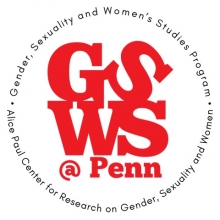As COVID 19 continues to reshape our lives, members of the GSWS/APC community take this opportunity to acknowledge the ways that responses ranging from the federal government, to schools, to households, fail to consider how gender, race, sexuality, and class are shaping people’s experiences of this crisis. From the increased care burden on women who are forced to bear the brunt of work from home policies, to the shockingly disparate rates of infection and death from COVID 19 along racial lines, this unprecedented crisis is laying bare the gender, race, and class imbalances that have shaped this country from its founding.
Feminist scholars have long analyzed the devaluation of care work, which is coupled with the unequal distribution of burdens along racial, class, and gendered lines in both the formal economy and the household. Put simply: women bear the brunt of care work at all levels. Women paid for care work (as nannies, domestic workers, and home health aides) are both disproportionately women of color or from immigrant communities and paid poorly because of the devaluation of care work in the economy. Women who are afforded the ability to work from home tend to be unequally burdened by the well-documented “double-shift” wherein women take on the bulk of household responsibilities even when they also work in the formal economy.
The COVID 19 crisis puts these disparities into stark relief in several ways. The first divide separates those who are able to keep their jobs from those who cannot, and the second separates those who are able to “work from home” from those who must risk exposure to go to workplaces. Workers in essential industries and gig economy workers, including home health aides, nannies, domestic workers, and people working in service industries, risk increased exposure to the virus. Data from nearly every geographical region, and particularly from urban areas of the United States point to clear patterns: these workers tend to be African-American, Latinx, and other historically marginalized groups. Intersecting with the impact of these patterns, one in three women are defined as engaging in “essential” work under pandemic guidelines. These are the workers who are deemed “essential” in this moment: workers who very often do not make a living wage, do not have health care or other benefits, and, crucially, do not have paid sick leave. In 2014, for instance, over half of home care workers in the US relied on some form of public assistance (PHI 2016)
At the university, staff and faculty are under deep pressure to continue to function (somewhat) smoothly during this crisis, but also to care for their own family members, meanwhile dealing with huge increases in household tasks -- everything from new and labor-intensive homeschooling expectations to several additional hours of cleaning and cooking required each day under quarantine. These burdens are severe for single parents, decreasing time for “work” related activities and increasing the potential for burnout and/or other mental health challenges. The glaring conflict between performing “economic” work simultaneously with carework has not been addressed in a comprehensive way by anyone--neither at the level of federal or state governments nor by the administration at most universities, including the University of Pennsylvania, leaving employees at the mercy of empathetic (or not) direct supervisors to try to negotiate these competing priorities.
In university communities, the added caregiving burden is particularly acute for graduate students. In addition to the stresses of helping to move courses online as TAs and instructors (without an increase in wages) and re-working their research plans and grant proposals in response to COVID-19 travel restrictions, graduate students with caregiving responsibilities are not being given the appropriate accommodations needed to attend to all of these changes. Here at Penn, graduate student parents have been informed that there will be no policy from the Provost that requires faculty to give special consideration to students with caregiving responsibilities, again leaving caregivers at the mercy of an empathetic (or not) professor, advisor, and/or chair.
More broadly, COVID 19 has laid bare some of the chronic inequities in the education system, disparities which again, fall along race and class lines. The challenges faced by first generation students and students in historically marginalized groups are many: from accessibility issues for online learning to lack of secure housing. For some students in the LGBTQ community, going “home” has meant going back in the closet and/or losing community that affirms their identity. For staff at universities, we have already begun to see the effects of salary and hiring freezes, which will no doubt impact those who are already struggling. There is also a note of disparity even within these policies at the university level. For non-standing faculty and graduate students, there is an additional layer of precarity resulting from a shrinking pool of jobs in higher education and the deprioritization of funding for lecturers and other non-tenured positions.
COVID 19 is also exposing and deepening gendered and raced disparities in health outcomes and access to healthcare. Historically, African-American, immigrant, Native American and economically marginal white communities have had limited access to quality healthcare. This disparity in access to care compounds the impact of other factors that determine health. Impediments to safe and affordable housing, poor air quality, a lack of education beyond high school, and financial insecurity can all contribute to ill health. In addition, many marginalized communities suffer from underlying chronic health problems. People in these already vulnerable communities face financial disaster as a consequence of shutdowns that have cost them their jobs. Others jeopardize their already compromised health to continue working in occupations that require continued risk of exposure to the virus. Six feet of social distance and work from home are luxuries they cannot afford. Conditions such as these compound the precariousness of life and have resulted in a disproportionate rate of infections and deaths from the COVID-19 virus in African American communities. Immigrant communities have also suffered disproportionately, and for undocumented immigrants this suffering includes a very real fear of arrest and deportation when seeking medical assistance. Native American communities are bracing for a wave of illness projected to overrun limited Indian Health Service resources. The global pattern of higher mortality for men from COVID-19, while potentially valuable for opening up new understandings of the social dimensions of the virus’s lethality, has sparked hypotheses about gendered behaviors that need further scrutiny along the intersectional lines of race, class, and the unequal impact of unhealthy environments. It is further worth stressing that the university community and African-American, immigrant, and Native American communities are not mutually exclusive and those of us within and of those communities may be dealing with compounding stressors that make our university work even more challenging.
Nursing, which remains a largely gendered workforce, comprises the frontline of this epidemic, alongside other healthcare workers. Across social media and mainstream network coverage, nurses and other healthcare providers are labeled as heroes, yet many are required to improvise their own personal protective equipment, stretch scarce resources, and maintain patient care while also exposing their own families as they travel back and forth between home and work. In addition to extended hours at work and caring for patients with and without COVID-19, nurses and caregivers often face increased care work at home. Some have become sick or have died as a result of caring for those who have COVID-19. At this time, nurses and caregivers face additional burdens at work, including the emotional labor of caring for patients who can no longer have their friends or family at the bedside. It is also worth noting that nurses have been confronting social isolation protesters as a consequence of advocating for the public to observe isolation guidelines in order to curb the surge of COVID-19 cases. While caregivers are being recognized in this current moment, this pandemic should prompt reflection on the need to respect caregivers and provide them with the appropriate protection and compensation once the pandemic is over.
Clearly the remedies needed to address the disparities outlined above go beyond the authority of institutions like the university. We need deep and far-reaching changes to the way that our society supports caregivers, parents, workers, students, and victims of economic disaster and illness. It is our firm belief that these long standing discrepancies must be addressed in a comprehensive way by federal and state governments. But in the meantime, we call on our communities at Penn to acknowledge that our positions in our households intersect with our positions in the academic and wage-earning worlds, often intensifying the impact of COVID closures and work-from-home orders. The current work-from-home circumstances cannot be sustained.
Signed,
-
Gwendolyn Beetham, Associate Director, Gender, Sexuality and Women’s Studies Program
-
Shana Bahemat, Program Coordinator, GSWS & APC
-
Maria Murphy, Interim Associate Director, Alice Paul Center
-
Kathleen Brown, David Boies Professor of History and Director, GSWS & APC
-
Melissa E. Sanchez, Donald T. Regan Professor of English
-
Adam Sax, PhD Candidate, Comparative Literature
-
Jessa Lingel, assistant professor, GSWS & Annenberg School for Communication
-
David Azzolina, Academic Engagement Librarian
-
Karen Redrobe, Jaffe Professor of Cinema and Modern Media; Director, Wolf Humanities Center
-
Archana Kaku, PhD Candidate, Political Science
-
Josephine Park, Professor of English and Asian American Studies
-
Yara M. Damaj, PhD Student, Political Science
-
Catherine Bryson Professor of English
-
Suvir Kaul, A M Rosenthal Professor of English
-
Nancy Bentley, Donald T Regan Professor of English
-
Emily Steinlight, Stephen M. Gorn Family Assistant Professor of English
-
Linda H. Chance, Associate Professor of Japanese Language and Literature
-
Ricardo A. Bracho, Abrams Artist-in-Residence, GSWS & APC
-
David L. Eng, Richard L. Fisher Professor of English
-
Zachary Lesser, Professor of English
-
Raka Sen, Doctoral Student, Sociology
-
Angelina Eimannsberger, Ph.D. Student, Comparative Literature
-
Whitney Trettien, Assistant Professor of English
-
Toni Bowers, Professor of English
-
Deborah A. Thomas, R. Jean Brownlee Professor of Anthropology
-
Jennifer Ponce de León, Assistant Professor of English
-
Sheila Murnaghan, Allen Memorial Professor of Greek, Classical Studies
-
Wendy Grube, Director, Center for Global Women’s Health, Practice Associate Professor, Nursing
-
Gabriel Salgado, Ph.D. Candidate in Political Science
-
Matty Hemming, Ph.D Student, English
-
Nancy J. Hirschmann, Stanley I Sheerr Term Professor in the Social Sciences
-
Alicia Meyer, Ph.D. Candidate, English
-
Mark Bookman, Ph.D. Candidate, East Asian Languages and Civilizations
-
Davy Knittle, Ph.D Candidate, English
-
Maja Sidzińska, Ph.D. Student, Philosophy
-
Riley McGuire, Ph.D. Candidate, English
-
Rovel Sequeira, Ph.D. Candidate, English
-
Audrey Jaquiss, Ph.D. Student in Political Science
-
Ethan Plaue, Ph.D. Student, English
-
Ava Kim, PhD Candidate, English
-
Shoshana Adler, Ph.D Candidate, English
-
Herman Beavers, Professor of English, Africana Studies
-
Nat Rivkin, Ph.D. Student, English
-
Robin Leidner, Associate Professor of Sociology
-
Max Cavitch, Associate Professor, English
-
Hilary R. Whitham, PhD Candidate, History of Art
-
Aylin Malcolm, Ph.D. Candidate, English
-
Marie Gottschalk, Professor of Political Science
-
Siyen Fei, Associate professor of History
-
Paul K. Saint-Amour, Walter H. and Leonore C. Annenberg Professor in the Humanities
-
Andrew T. Lamas, Urban Studies (SAS) & NonProfit Leadership (SSPP)
-
Hannah LeClair, Ph.D. Student, Comparative Literature
-
Siarhei Biareishyk, Visiting Assistant Professor, Germanic Languages and Literatures
-
Jess Shollenberger, Ph.D. Candidate, English
-
Kevin M. F. Platt, Russian and East European Studies
-
Anita Allen, Vice Provost for Faculty and Professor of Law
-
Sarah Carson, Ph.D. Candidate, Anthropology
-
Mike Gadomski, Ph.D. Student, Philosophy
-
Kristina Mitchell, PhD Candidate, Hispanic and Portuguese Studies
-
Cassandra Dula, J.D./M.S. Candidate, Penn Law/Department of Criminology
-
Kim Fernandes, PhD student, Education and Anthropology logy
-
Aisha Chughtai, PhD Student, Anthropology
-
Andre Dombrowski, Associate Professor, History of Art
-
Veronica Brownstone, PhD Student, Hispanic and Portuguese Studies
-
Frances Rodriguez, J.D. Candidate, Penn Law
-
Helen Stuhr-Rommereim, PhD Student, Comparative Literature
-
Hanne Harbison, Lecturer, School of Nursing
-
Rebecca Naegele, Master of Fine Arts candidate
-
Litty Paxton, Associate Dean for Undergraduate Studies, Annenberg School
-
Dawn Teele, Assistant Professor, Political Science
-
Eilidh Beaton, PhD Candidate, Philosophy
-
Sarah H. Kagan, Professor C-E, School of Nursing
-
Clare Whitney, PhD, School of Nursing & Dept of Medical Ethics and Health Policy
-
Kristen R. Ghodsee, Professor of Russian and East European Studies
-
Isaac Rabbani, PhD Student, Economics
-
Bethany Monea, PhD Candidate, Graduate School of Education
-
Karen Detlefsen, Professor of Philosophy and Education
-
Rosemary DuBrin, PhD Student, Political Science
-
Dagmawi Woubshet, English
-
Lisa Miracchi, Assistant Professor, Philosophy
-
Hanyu Ma, PhD Candidate, Philosophy
-
Allauren Forbes, PhD Candidate, Philosophy
-
Sara Purinton, PhD Candidate, Philosophy
-
Dana Khromov, PhD Candidate, Romance Languages
-
Amy Hillier, Associate Professor, School of Social Policy & Practice
-
Fariha Khan, Associate Director, Asian American Studies
-
Julia Bloch, Director, Creative Writing Program
-
Dixon Li, PhD Candidate, English
-
Sophie Hochhaeusl, Architecture
-
Devin William Daniels, PhD Candidate, English
-
Serena Mayeri, Professor of Law and History, Law School
-
Pilar Gonalons-Pons, Assistant Professor, Sociology
-
Kathy Hall, Associate Professor, GSE
-
Dorothy Roberts, University Professor of Africana Studies, Law, and Sociology
-
Toni Bowers, Professor, English, SAS
-
David Kazanjian, English and Comparative Literature, SAS
-
Rupa Pillai, Senior Lecturer, Asian American Studies
-
Peter Van Do, Lecturer, Asian American Studies
-
Bethany Wiggin, Faculty Director of the Penn Program in Environmental Humanities and Associate Professor of German

 The Program in Gender, Sexuality, and Women’s Studies
The Program in Gender, Sexuality, and Women’s Studies


